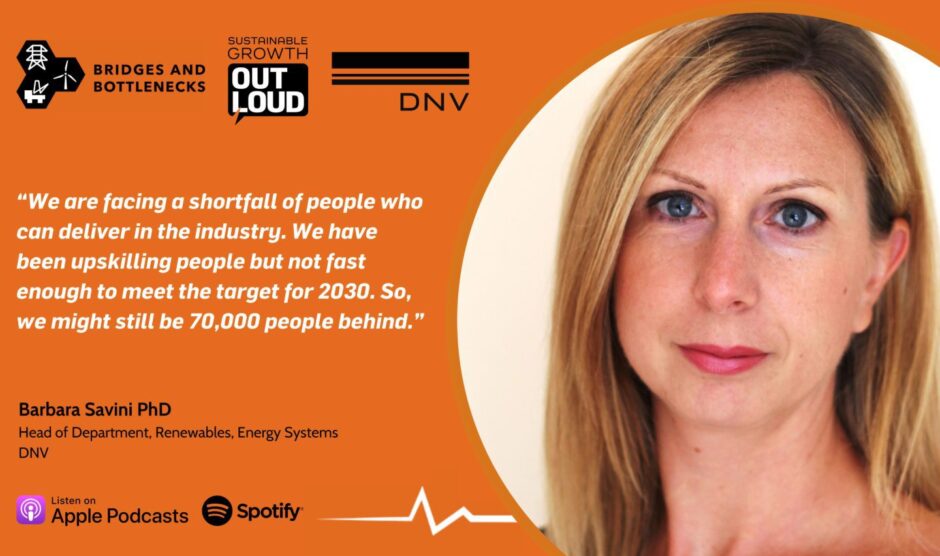
Bridges and Bottlenecks is the latest podcast series by Energy Voice Out Loud in partnership with DNV. Each episode looks to address the hard-hitting issues within the energy transition. Technology exists that will be the bridge to take us there, but there are still a number of bottlenecks that stand in the way of progress.
Joining Energy Voice’s print features lead, Ryan Duff, is DNV’s Head of Renewables Department Barbara Savini and Danielle Lane Director of Offshore Development UK and Ireland for RWE.
The three dive into offshore wind in the UK, the issues the sector is facing and the opportunities it can provide for businesses.
One of the main concerns highlighted in by the group was the skills shortage the industry is facing and how wind developers can hope to bring on board the talented workforce needed to see success.
Barbra Savini said: “We are facing a shortfall of people who can deliver in the industry, we have been upskilling people but not at the fast pace that we need to meet the target for 2030. So, we might still be 70,000 people behind.”
She added: “The short-term shortage of skills is especially in the area of electrical engineer and technical electrical technicians, which are key both for offshore wind project development and on the grid side of things and on storage if we want to use battery storage to support the grid stabilisation.
“It’s a kind of crunch point where we need the same skill set across a number of activities.”
Danielle Lane shed some light on how this skills gap is impacting offshore wind developers and what is being done to alleviate the issue.
Ms Lane supported what was said by DNV’s Head of Renewables Department “massively.”
She added: “We often forget that these projects are delivered by people and the skills challenge that we face is huge, really, really massive.
“We see it today in trying to recruit offshore consenting skill set where we just really struggle to find the people both with the experience but also who even sometimes know about the industry, I think it’s curious that offshore wind has been around for so long in the UK, and yet it’s still relatively unknown.”
RWE’s Director of Offshore Development UK and Ireland said that the offshore wind industry has to accept some responsibility for the lack of public knowledge of the sector as she outlined how to fix the problem.
Ms Lane commented: “That’s something on the industry to actually really be out there and visiting schools, universities, spreading the word that this is a great place to come and work.”
To hear what other challenges are facing the industry and how offshore wind can create opportunities throughout the energy transition, listen to episode three of Bridges and Bottlenecks on your podcast platform of choice.
Recommended for you




